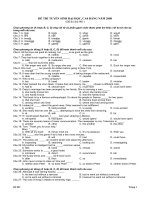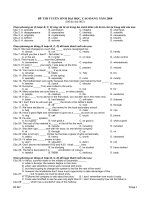Tiếng Anh
Bạn đang xem bản rút gọn của tài liệu. Xem và tải ngay bản đầy đủ của tài liệu tại đây (108.42 KB, 6 trang )
<span class='text_page_counter'>(1)</span><div class='page_container' data-page=1>
EXERCISE UNIT 7: TRAFFIC
<b>A. VOCABULARY:</b>
- accident (n) tai nạn
- bike (n) xe đạp
- boat (n) /bəʊt/: con thuyền
- breakdown (n) hỏng xe, chết máy
- bus (n) xe buýt
- car (n) xe hơi
- coach (n) xe khách
- corner (n) góc phố
- crossroad (n) ngã tư
- cycle (v) /saɪkl/: đạp xe
- driver (n) tài xế
- fly (v) /flaɪ/: lái máy bay, đi trên máy bay
- fork (n) ngã ba
- helicopter (n) /'helɪkɒptər/: máy bay trực thăng
- illegal (adj) /ɪ'li:gl/: bất hợp pháp
- main road (n) đường lớn
- motorbike (n) xe máy
- one-way street (n) đường một chiều
- park (v) /pɑ:k/: đỗ xe
- passenger (n) hành khách
- pavement (n) /'peɪvmənt/: vỉa hè (cho người đi bộ)
- pedestrian (n) người đi bộ
</div>
<span class='text_page_counter'>(2)</span><div class='page_container' data-page=2>
- plane (n) /pleɪn/: máy bay
- police (n) cảnh sát
- prohibitive (adj) /prə'hɪbɪtɪv/: cấm (không được làm)
- railway station (n) /'reɪlwei ,steɪ∫n/: nhà ga xe lửa
- reverse (n) /rɪˈvɜːs/: quay đầu xe
- ring road (n) đường vành đai
- road (n) đường
- road sign /rəʊd saɪn/ (n): biển báo giao thông
- roadside (n) lề đường
- roof (n) /ru:f/: nóc xe, mái nhà
- safety (n) /'seɪftɪ/: sự an toàn
- seatbelt (n) /'si:t'belt/: dây an toàn
- ship (n) /ʃɪp/: tàu thủy
- signpost (n) biển báo
- speed limit (n) giới hạn tổc độ
- speeding fine (n) phạt tốc độ
- to crash (v) đàm, tai nạn (xe)
- to have an accident (v) bị tai nạn
- to slow down (v) chậm lại
- to speed up (v) Tăng tốc
- traffic jam (n) /'træfɪk dʒæm/: sự kẹt xe
- traffic light (n) đèn giao thơng
- traffic rule (n) /'trỉfIk ru:l/: luật giao thơng
- train (n) /treɪn/: tàu hỏa
</div>
<span class='text_page_counter'>(3)</span><div class='page_container' data-page=3>
- tricycle (n) /trɑɪsɪkəl/: xe đạp ba bánh
- turning (n) : chỗ rẽ
- vehicle (n) : xe cộ, phương tiện giao thông
<b>B. GRAMAR:</b>
<b>1. Dùng “it” để chỉ khoảng cách</b>
Chúng ta có thể sử dụng “it” ở vị trí chủ ngữ để chỉ khoảng cách.
Ex: It is about 300 metres from my house to the bus stop.
(Từ nhà tôi đến trạm xe buýt khoảng 300m.)
<b>2. Cách dùng used to (The use of used to)</b>
Chúng ta sử dụng used to (đã từng) khi nói về thói quen trong q khứ nhưng nay
khơng cịn nữa.
Ex: When I was a child, I used to go to Suoi Tien.
(Khi cịn nhỏ, tơi đã từng đi Suối Tiên.)
<b>• Cách thành lập Used to</b>
<i><b>- Thể khẳng định (Affirmative form):</b></i><b> S + used to + V-infi....</b>
Ex: I used to live in Hue. Tơi đã từng sống ở Huế.
(nhưng giờ khơng cịn ở đó nữa)
<i><b>- Thể phủ định (Negative form):</b></i><b> S + didn’t + use to + V- infi....</b>
Ex: My father didn’t use to smoke cigarette.
Bố tôi trước đây không hút thuốc (nhưng bây giờ bắt đầu hút thuốc).
<i><b>- Thể nghi vấn (Interrogative form): </b></i><b>Did + s + use to + V- infi....?</b>
Ex: Did you use to work in the post office?
(Có phải trước đây anh đã từng làm việc ở bưu điện không?)
<b>C. EXERCISE:</b>
<b>I. Find the word which has a different sound in the part underlined.</b>
</div>
<span class='text_page_counter'>(4)</span><div class='page_container' data-page=4>
<b>5. A. nearest B. head C. bread D. health</b>
<b>II. Find the odd once out A, B, C or D.</b>
1. A. riding B. driving C. gardening D. flying
2. A. no cycling B. no parking C. no right turn D. sign
3. A. train B. plane C. car D. sail
4. A. by car B. on foot C. by bus D. by bicycle
5. A. rule B. ride C. reverse D. drive
<b>III. Choose the best option A, B, C or D to complete the sentence.</b>
1. Minh used to...his homework late in the evening.
A. does B. do C. doing D. did
2. If people...the rules, there are no more accidents.
A. follow B. take care of C. obey D. remember
3. You should...right and left when you go across the roads.
A. see B. look C. be D. take
4. Hurry up or we can't...the last bus home.
A. keep B. follow C. go D. catch
5. Lan used to go to school...
A. with bicycle B. by foot C. in car D. by bus
6. Public...in my town is good and cheap.
A. transport B. tour C. journey D. travel
7. ...is not very far from here to the city centre.
A. That B. This C. It D. There
8. When there is a traffic jam, it...me a very long time to go home.
A. costs B. takes C. lasts D. spends
9. Mai's dad usually drives her to school...her school is very far from her
house.
A. but B. though C. because D. or
10. Yesterday Hoa and Lan...round West Lake. It took them an hour.
A. cycle B. cycles C. cycling D. cycled
<b>IV. Fill each blank with a word given in the box:</b>
vehicles across did ride feels
break it rules accidents after
1. What...you do last Sunday?
2. I stayed at home and looked...my younger brother yesterday.
3. Does your bike ever...down on the way to school?
4. We must always obey traffic...for our safety.
5. How far is...from your house to the bus stop?
6. He used to...a tricycle when he was three years old.
</div>
<span class='text_page_counter'>(5)</span><div class='page_container' data-page=5>
8. There did not use to be many...on the roads in my home town.
9. He lives in a small village in the mountains so he never...worried
about traffic jams.
10. You should remember to walk...the streets at the zebra crossings.
<b>V. Rewrite the following sentences so that their meaning stays the same, using</b>
<b>the words give.</b>
1. The distance from my house to school is about 500 metres. (It)
...
2. My father went to work by car some years ago, but now he goes by bus. (used
to)
...
3. Don't drive too fast or you'll have an accident. (If)
...
4. Is it possible to go to Sa Pa by motorbike? (Can)
...
5. My mother is a careful driver. (drives)
...
6. He had a stomachache. He didn't wash his hands. (so)
...
<b>VI. Read the passage and choose the best answer:</b>
Yesterday, on the way home from school, I saw an accident. A boy was run over
by a taxi when he was riding his bicycle. The boy's leg was broken and it was
bleeding badly. Someone there tried to stop the bleeding. They put pressure on it
and held it tight. A man used his mobile phone to call the emergency service. Some
minutes later, an ambulance arrived and sent the boy to the hospital. Two
policemen came to the scene immediately. Some people told the police that the taxi
was driving at a very high speed when the accident happened. Some others began
talking about the traffic accidents these days and blamed the increasing number of
accidents on the roads for careless driving and drunk drivers.
1. What did the writer see yesterday?
A. a fire B. an accident C. a fighting D. a crash
2. The accident happened between a taxi and...
A. a bus B. a car C. a bicycle D. a motorbike
3. The boy was sent to the hospital by...
A. a police B. a car C. an ambulance D. a passenger
4. What part of his body was hurt? – His...
A. arm B. leg C. head D. shoulder
5. How was the driver driving when the accident happened? – Very...
A. slowly B. fast C. carefully D. well
</div>
<span class='text_page_counter'>(6)</span><div class='page_container' data-page=6>
This composition is about my aunt's (1)... in Florida last year.
She hired a car at Miami (2)... , and soon (3)...lost. So, she stopped to ask a
young man how to get to the hotel.
Unfortunately, the young man had a gun; he made my aunt get (4)... of the
car, and she had to give him all her money.
Luckily, a police car drove past a few minutes later and (5)... . Then, the police
arrested the thief and got my aunt's money back.
(6)... the end, my aunt had quite a good holiday, but she said that she was happy
to get back home.
1. a. holiday b. vacation c. festival d. a & b
2. a. airport b. airway c. airplane d. airstrip
3. a. took b. had c. got d. caught
4. a. in b. out c. inside d. outside
5. a. picked her up b. picked up her
c. showed her around d. showed around her
6. a. In b. At c. On d. When
<b>VIII. Make up sentences using the words and phrases given:</b>
1. We/ used/ school/ on/ foot.
...
2. about / 30km/ my town/ Ha Long Bay/.
...
3. My family/ used/ go / holiday / seaside / summer/.
...
4. How/ long / it / take/ you/ Ha Noi / Sa Pa/?
</div>
<!--links-->









